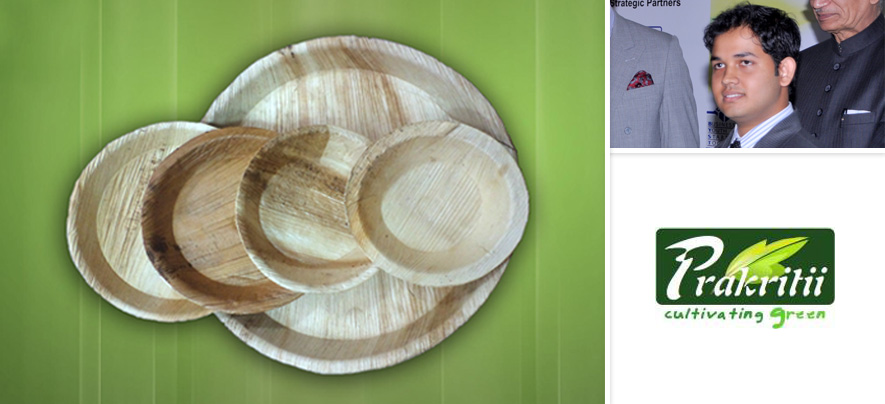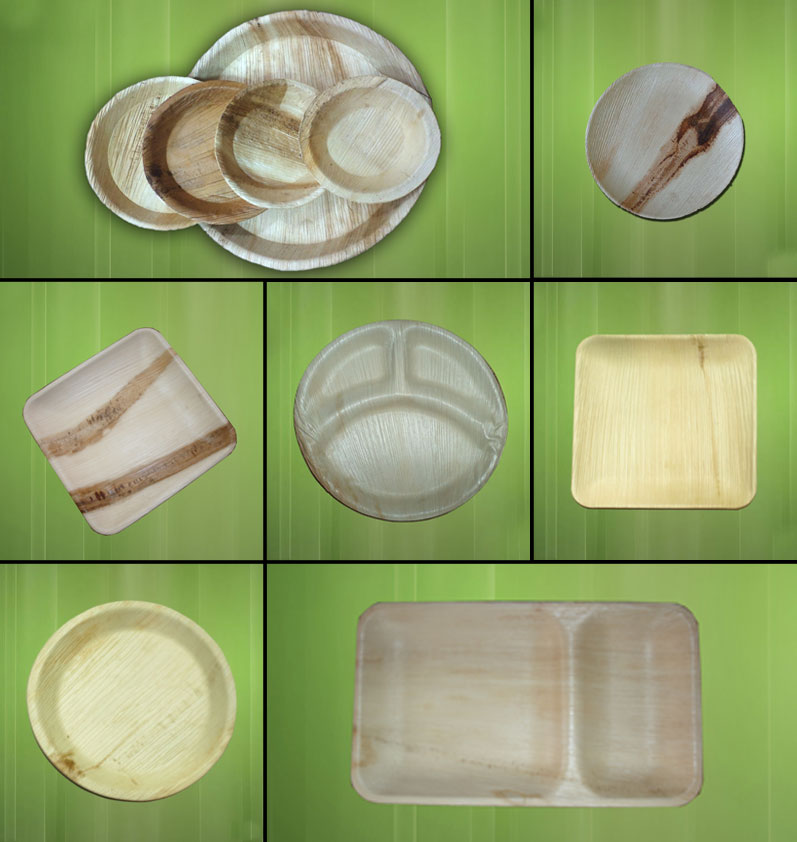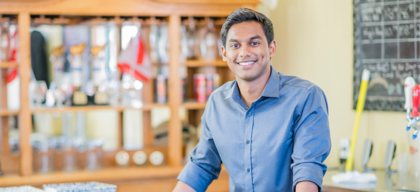This Ecopreneur is Creating Environment-friendly Dinnerware

SME Inspirations
461 week ago — 10 min read
Amardeep Bardhan, Co-founder & Partner, Prakritii – Cultivating Green
Being awarded by Prince Charles, Prince of Wales, at the age of 22, for a concept which is not only eco-friendly and innovative but also marketable and affordable is not a coincidence. Born and brought up in Assam, Amardeep Bardhan, knew the importance of protecting the environment and the fragile eco-system. He had grown up watching elders around him use tree leaves as plates and as a base for worshipping in temples.
While in New Delhi for his management studies in 2010, he witnessed the extensive use of non-biodegradable plastic and thermocol dinnerware for tea, snacks and street foods. This got Amardeep and co-founder, Vaibhav Jaiswal thinking. After several brainstorming sessions, they launched Prakritii – Cultivating Green. Prakritii manufactures eco-friendly and biodegradable disposable dinnerware, an alternative to plastic and thermocol dinnerware.
GlobalLinker (GL) spoke to Amardeep Bardhan (AB), about his eco-friendly venture.
GL: You have been awarded by Prince Charles, Prince of Wales, for your eco-friendly and innovative concept. How did this happen?
AB: The concept came from a thought – the world is looking for for sustainable energy solutions by switching to green energy, green vehicles, treatment of sewage water etc., so why don’t we contribute to nature by taking some small initiatives. We see every day that the use of plastic and polystyrene or thermocol plates and bowls is growing in parties, street food stalls and functions, among others. Hence, we thought of coming up with an alternate solution to these disposables.
As I come from Assam, I saw that in some villages, people use arecanut sheets to feed animals and sometimes use it as a base for placing lamps and ‘prasads’ while worshipping. Hence, we thought why not transform these waste leaves to beautiful and elegant dinnerware.
Vaibhav and I invested time to make our idea a feasible concept. During the process, we presented our ideas on various platforms like IIT Bombay, IIT Kanpur, IIT Chennai, IIMs among other institutes. At each and every step we learned and improvised our plan. Finally, the Confederation of Indian Industry (CII) invited us to participate in a pan India eco-friendly business idea contest, in which we had the best show and were finally selected to be awarded by Prince Charles, Prakash Singh Badal, CM of Punjab and Shivraj Patil, then Governor of Punjab at Punjab Governor House during the Commonwealth Games in 2010.
GL: How did you meet and identify your co-founder?
AB: My partner Vaibhav Jaiswal and I studied management together. Being classmates, we shared the same passion for creating something new. We used to brainstorm on various subjects before the concept of eco-friendly disposable dinnerware clicked. The common force that bound us was our commitment to give back to nature and our desire to be entrepreneurs rather than job seekers after our management course. Thus, Prakritii was born.
GL: Why did you choose arecanut leaves?
AB: Arecanut or ‘Supari’ as known in Northern India, is mostly enjoyed with betel leaves or ‘paan’. While the arecanuts are consumed, the sheaths attached to the trees are either left to rot or burnt. Due to the abundant arecanut plants in the North East and South region, we thought of producing our dinnerware from it.
Only the naturally fallen leaves are collected from farms. No leaves are plucked for making disposables. The collected leaves are washed, dried and are finally processed under a heat press machine. No bonding agent, glue or artificial materials are used for the production.
GL: Were you concerned about the dominance of plastic products in the market and the consumer adoption rates?
AB: The concept was new and different when we started our venture. Of course, the prices of our products were comparatively higher than other available disposables in the market. Hence, we had to cater to a very niche consumer segment and invested time in creating awareness of using green products. Gradually, the green concept took a leap in India. We saw various brands launching green versions of their products like green tyres, green houses and green refrigerators etc. Even, the Videocon logo turned green, and this changing scenario helped us in taking a step forward.
The response to our products was overwhelming. However, initially the price was a constraint but eventually as the scale of production grew and we expanded our market, the cost of products came down and our products started reaching the masses.
Since the product was elegant and unique, customer acceptance was high. Though, we never faced any product related criticism, the only constraint we had was to match the price with the thermocol and plastic disposables. However, customers appreciated our product quality and aesthetic appeal.
GL: What is the USP of your product?
AB: The USP of Prakritii dinnerware is that it is 100% eco-friendly. When we look at the disposable industry, we see that there are two segments – one is the plastic and thermocol disposables which are non-bio-degradable and the other segment is of eco-friendly disposable. In the eco-friendly segment, we can see disposables made of corn starch, bagasse and clay and out of all these, Prakritii dinnerware stands out. Our dinnerware is sturdy, elegant and the most important aspect is that it is wallet friendly. We also offer customised solutions to our customers like special designs according to festivals, weddings and events. We also make items like pencil boxes and serving trays.
GL: Who are your majority buyers?
AB: We are basically into wholesaling, hence, we have a wide market for our products. 80% of our orders are bulk orders and 20% are the orders placed by end users. Currently, we have a wide range of clientele from resorts, hotels, motels, restaurants, and bakeries etc., located in various parts of India. Apart from this, the ISKON Temple, Bahai Temple (Lotus Temple) and various NGOs like Green Peace India also use our products.
Our valued customers also include Radisson Blu Hotel, Kwality Group, India Today Group, Anandvan Resorts, Healthy Bakes, Guptaji Roti Wale, Keya Kainoosh DLF Promenade among others. We are also exporting our products to Australia, Dubai, UK, Malaysia and USA.
GL: Your business also has a considerable presence online. How has e-commerce helped your business?
AB: Selling products online always makes a difference. The reach is higher and it creates awareness too. Initially, we focused on improving the production style so that the end users get the best disposable in the segment. We took various steps to increase the quality of production and introduced several designs. The next step was to go online. Online presence gave us credibility and a market which we could not reach directly. The market then was not restricted to India only. The response was very good which also helped us to build our brand.
GL: How has Prakritii made a difference?
AB: Prakritii is not only providing a sustainable alternative in the disposable industry, but also helping many villagers in South India to earn their livelihood. Although we have our own manufacturing unit, the demand for Prakritii dinnerware is so huge that with our own production we are unable to cater to it.
Therefore, we create small groups of people and help them with basic finance and train them to make such disposables.We understand that these small group of villagers cannot go the market to sell these products, hence we offer them a buyback option and buy all what they manufacture at an agreed price. We support them in the best possible way. Prakritii has created several jobs in rural India and has boosted entrepreneurship skills as well. Thus, the difference is not only limited to creating eco-friendly dinnerware but also building and promoting local skills and helping them to be self-dependent.
GL: What according to you is the future of entrepreneurs since the present government is startup friendly?
AB: I think everybody has got an entrepreneur within themselves. People in India are some of the most creative individuals across the globe. Yes, there is a considerable amount of risk involved in being an entrepreneur, but as an old proverb says – no risk no gain. However, to reduce the risk and also to support budding entrepreneurs, PM Narendra Modi has launched the Start Up India, Stand Up India initiative. This initiative consists of 19 exciting plans, right from seed funding, patent protection, relaxation of tax etc., which itself is a good platform for entrepreneurs. The creative brains must come out of their comfort shell and utilise this opportunity to its fullest. This shall not only generate employment, but will also make young India a proud country.
We see that most of the non-biodegradable waste consists of plastic bags and waste disposable, in general. Dumping of this plastic waste is also a challenge since it takes years to decompose. Whereas our products are made from natural waste and when disposed they go back to the earth. It usually takes 5-7 days to decompose completely by dumping it into a pit. Hence, as a part of Swachh Bharat Abhiyan, if we all start using such disposables and dump the waste in a kitchen garden or in a pit, it shall reduce the carbon foot prints in the country. Further, these waste once decomposed can also be used as manure.
Disclaimer: This article is based solely on the inputs shared by the featured member. GlobalLinker does not necessarily endorse the views, opinions & facts stated by the member.

Posted by
GlobalLinker StaffWe are a team of experienced industry professionals committed to sharing our knowledge and skills with small & medium enterprises.
View GlobalLinker 's profile
Most read this week










Comments
Please login or Register to join the discussion